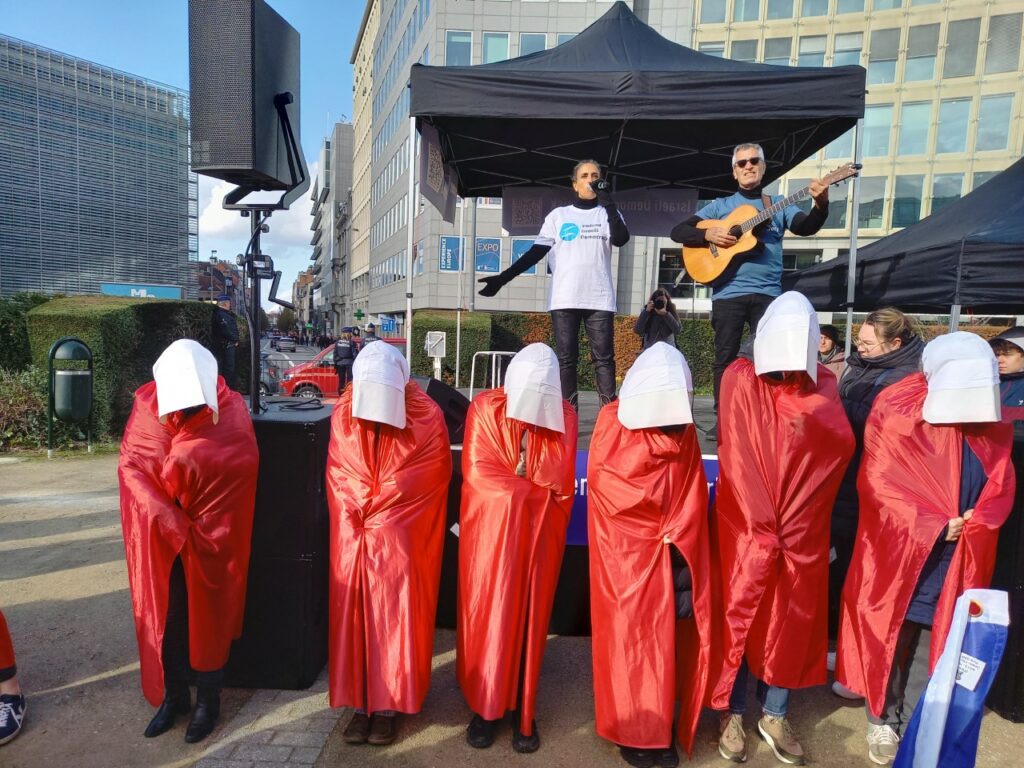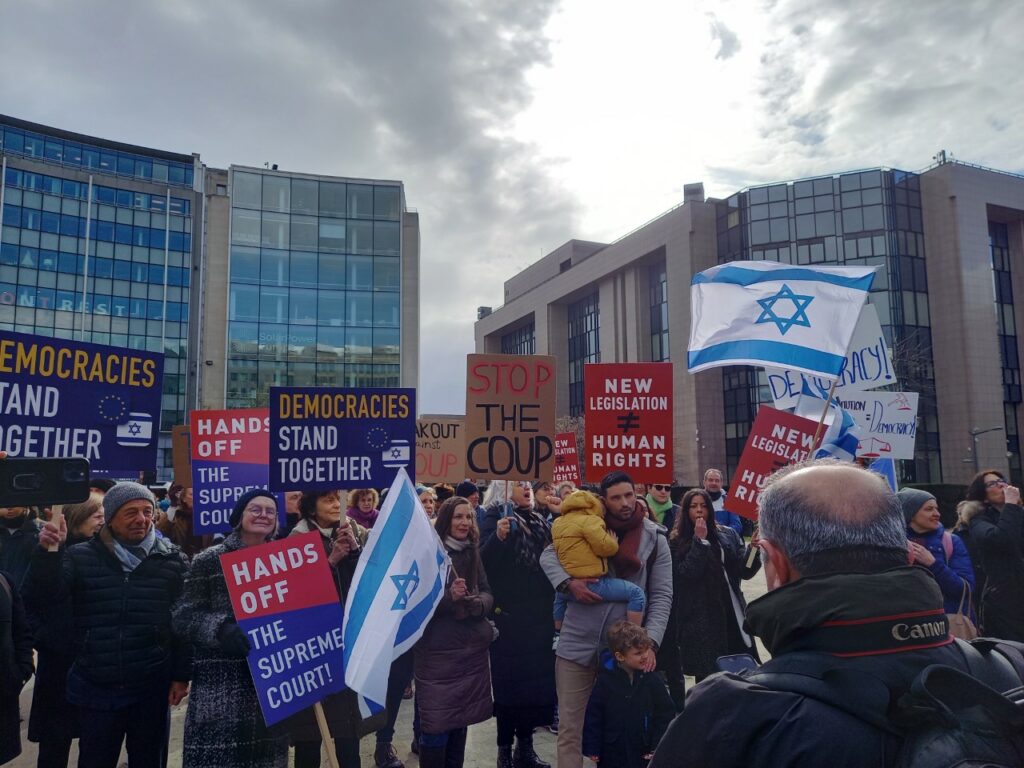A second demonstration against the far-right Israeli government’s proposal for a judicial reform took place at Schuman Square opposite the European institutions on Monday afternoon while Israel was rocked by mass demonstrations and a general strike which forced the government to suspend the legislation process and agree to discussions with the opposition.
As the previous demonstration, this one was also organized by pro-democracy Israeli expats in Brussel and called on the EU to speak out. This time the disappointment about EU’s silence was clearly felt among the hundreds of protestors who had gathered to listen to the Israeli singer and peace activist Achinoam Nini (‘Noa’) and other speakers.
“We are gathered here in the heart of the EU quarter because we’re scared,” said Dan Sobovitz, one of the organisers of the demonstration. “We chose to stand in front of the EU institutions out of deep respect for EU democracy and EU values. But we need to hear these messages echo back to us. Your silence is deafening us! A judicial coup is happening during your term in power.”
In a direct appeal to the presidents of the European institutions (the Parliament, the Council, and the Commission), the EU foreign policy chief, and the Prime Minister of Sweden, currently in charge of the EU Presidency, he appealed to them to act, to speak out and do their utmost to help saving Israel’s democracy.
“The collapse of Israeli democracy will harm Europe as well and cause instability in the region. If you let democracy fall in Israel, other democracies will follow.”
Noa, the singer, stressed that democracies are connected and must come to each-other’s help if democracy is threatened in one of them. Benjamin Beeckmans, chairman of the Jewish Secular Community Center in Brussels (CCLJ), appealed to the EU leaders to support the same values and rights in Israel as elsewhere in the EU such as gender equality and LGBTQ rights.
Among the speakers were Eli Barnavi, a historian and former Israeli ambassador to France, Joab Rosenberg, a reserve colonel in the Israeli army, and Kobi Kurz, director of a Dutch innovation center. They all warned that the proposed judicial reform will undermine the rule of law in Israel, derail the peace process, threaten its security and damage the motor in its economy, the high-tech sector.
The Israeli government was democratically elected and claims that it got a mandate to restore the proper balance between the different branches of government and legislate against what it considers the overreach of the judiciary. In fact, the details of the proposal were not presented before the elections and not mentioned in Prime Minister Netanyahu’s priorities at the first cabinet meeting.
According to the political opposition and the protest movement, the reform should rather be called a judicial coup or revolution because of its far-reaching consequences for the rule of law in the country and the way how the government has been trying to push it through in a number of weeks without any broad agreement.

Israeli singer and peace activist Achinoam Nini (‘Noa’) with ‘handmaids’ demonstrating against the judicial reform, Schuman Square, 27 March
Time out
In Israel, after a tumultuous and dramatic day, Prime Minister Benjamin Netanyahu, announced that he will take a “time out for dialogue” with the opposition. He announced that he has decided to “suspend” the second and third readings this week in the Knesset of a controversial law on the rules for selecting judges "in order to allow time to try and reach broad consensus". Despite his announcement, the government went ahead with a "technical preparation" of the legislation.
His decision follows the dismissal in the morning of the defense minister Joav Galant. In a televised speech on Saturday evening, the defense minister had called for a halt to the legislation because of the implications of the protests for Israel’s security, military preparedness and deterrence in face of increasing multiple threats.
For a while it was thought that at least three other Knesset members from Netanyahu’s own party (Likud) would follow Galant and vote against the judicial reform to deprive the government of its majority but this did not happen. Instead, Netanyahu mobilized his base and called on his supporters in “the national camp” to demonstrate in the streets for the reform. Their demonstrations resulted in violence against anti-reform protestors, Arabs, journalists and police.
“The great majority of the public recognizes the urgency of democratic reform of the judicial system,” Netanyahu claimed in the announcement. “We will not allow anyone to rob the people of its free choice. While we will not give up on the path for which we were elected, we will make the effort to achieve broad agreement.“
Lack of trust
"Stopping the legislation is the right thing,” commented Israel’s President Isaac Herzog, who’s own “People’s Framework” for a consensus solution had been rejected by the government. “This is the time to begin a sincere, serious, and responsible dialogue that will urgently calm the waters and lower the flames.”
The opposition leaders welcomed Netanyahu’s announcement with cautious optimism although they hardly trust him. However, for those demonstrating against the judicial reform the decision to stop the legislation came too late and is not credible. They will continue to demonstrate until the reform proposal has been completely shelved.
According to opinion polls published by two Israeli TV channels on Monday, the fortunes of the government and the opposition would reverse if elections were to be held today. The parties that formed the previous government would gain a majority of 61 – 62 seats against the current government’s 53 – 54 seats, with the remaining 5 seats going to two Arab parties.
It is not a dramatic change considering the dramatic events in Israel since Netanyahu formed his new government with far-right extremist parties and the fact that also a majority of those who voted for him disapprove the judicial reform.
No change in EU’s position
Where does the EU stand in all this? In a recent plenary debate in the European Parliament, High Representative Josep Borrell stated that he cannot interfere in an internal and still on-going debate in Israel on the judicial reform. “I do not want to prejudge the outcome of this debate. I am not part of this debate,” he told the MEPs.
Since then, tension in the region has increased and the implications of the proposed reform for regional stability have become clearer. Asked on Monday by The Brussels Times if the EU position has changed, Peter Stano, the EU lead spokesperson for foreign affairs, replied that the short answer is that nothing had changed and that there was nothing to add.
“What he said in the parliament is still valid. We are following developments very closely and still have trust in the ability of the Israeli democratic institutions to deal with the problem. It’s not for us to interfere in the lively internal debate in Israel.” He added that any EU statements only are issued if the EU member states agree on them.
M. Apelblat
The Brussels Times

